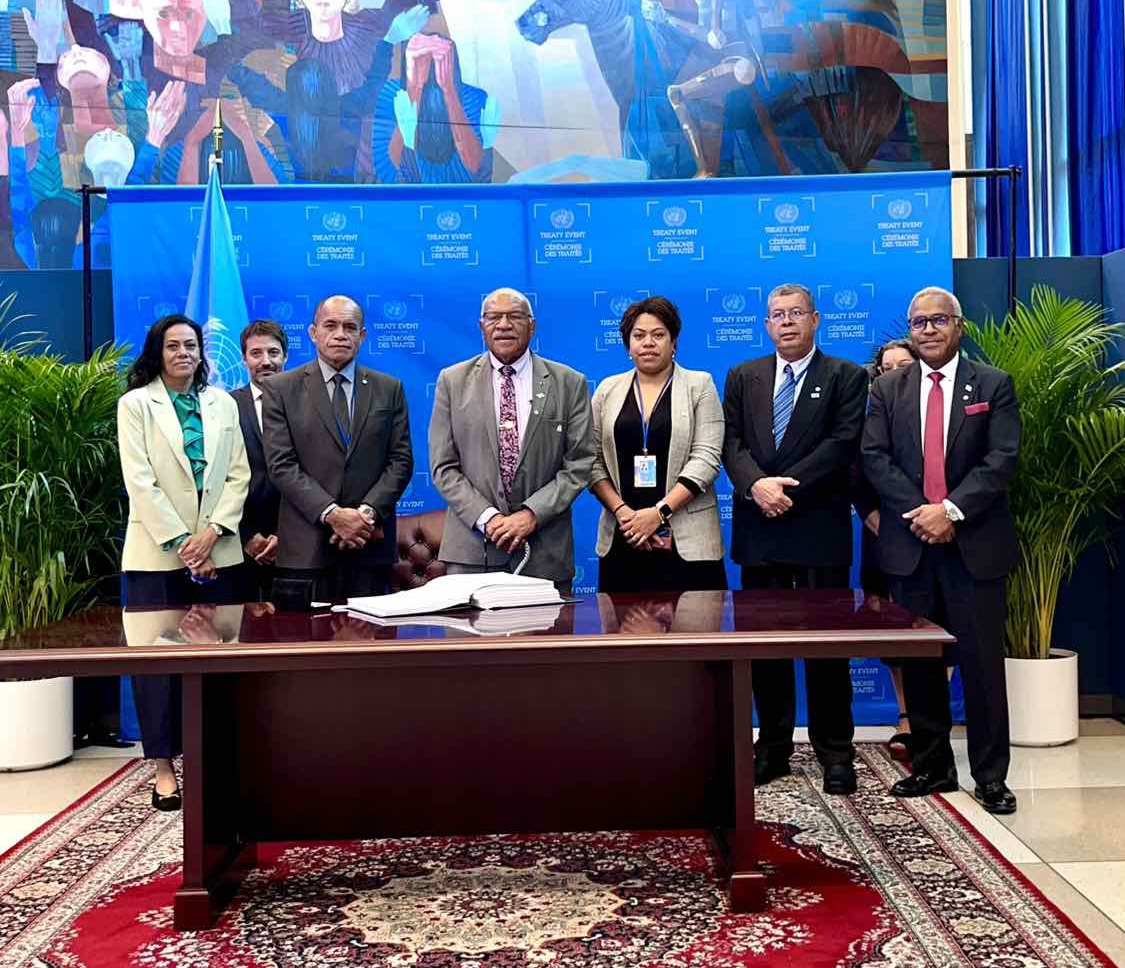In a momentous occasion held within the halls of the United Nations building on Wednesday, Fiji proudly stood as one of the first nations to sign the groundbreaking “Agreement under the United Nations Convention on the Law of the Sea (UNCLOS) on the Conservation and Sustainable Use of Marine Biological Diversity of Areas beyond National Jurisdiction,” colloquially known as the BBNJ Treaty.
This historic event, often referred to as the “High Seas Treaty,” marks a significant step towards the protection and sustainable utilisation of marine resources beyond national maritime boundaries, encompassing the vast expanse known as the high seas, which constitute nearly two-thirds of the world’s oceans.
The BBNJ Treaty signing by Fiji signifies the government’s unwavering dedication to ocean conservation and the responsible management of marine resources. Having been the first country to sign and ratify UNCLOS in 1982, Fiji continues to lead by example on the global stage in matters of ocean governance.
The objectives of this signing event extend beyond mere ceremony.
Fiji’s participation aims to expedite the ratification process of the BBNJ Treaty, with the ultimate goal of achieving its entry into force.
A minimum of 60 countries must ratify the Treaty to trigger its implementation.
This treaty is designed to enhance international cooperation and coordination among stakeholders to safeguard the ecological integrity and sustainable use of marine biodiversity in areas beyond national jurisdiction.
Key issues of particular relevance to Fiji and the Pacific region within the framework of the BBNJ Treaty include addressing the unique circumstances of Small Island Developing States (SIDS), recognising the essential role of traditional knowledge, indigenous peoples, and local communities, ensuring fair and equitable sharing of benefits derived from access to and utilisation of marine genetic resources, and promoting capacity building and technology transfer.
This momentous event signifies Fiji’s enduring commitment to preserving our oceans, fostering international collaboration, and securing a sustainable future for our marine ecosystems.
By signing the BBNJ Treaty, Fiji reaffirms its position as a global leader in marine conservation and environmental stewardship.
Meanwhile, during the High Level Panel for A Sustainable Ocean Economy meeting at the UN General Assembly, Prime Minister Sitiveni Rabuka stated, “Fiji, a nation with a profound connection to the ocean, is honoured to participate in a pivotal roundtable discussion at the United Nations General Assembly, addressing pressing questions concerning the future of our shared planet.”
Prime Minister Rabuka said Fiji’s unwavering commitment to safeguarding our invaluable oceans and pioneering ocean-based climate action underscores Fiji’s dedication to leading by example, for the benefit of present and future generations.
“Fiji’s primary focus for accelerating domestic ocean-based climate action in the near term centers around the robust implementation of its National Ocean Policy (NOP), which was adopted in 2017 and subsequently legislated in the Climate Change Act of 2021.”
The Prime Minister highlighted the groundbreaking nature of this policy, stating the policy emphasises the critical importance of oceans in climate resilience and calls for a comprehensive review every five years.
“Fiji is committed to mainstreaming climate change considerations into ocean governance to protect coastal communities, enhance food security, and preserve marine ecosystems.”
Furthermore, the Prime Minister outlined Fiji’s ambitious goal, stating, “Fiji’s ambitious goal is to sustainably manage 100 percent of its Exclusive Economic Zone (EEZ) by 2030, designating 30 percent as Marine Protected Areas.”
This commitment was described as being built upon three pillars: “conservation and biodiversity protection, a blue economy for inclusive growth, and climate action and ocean governance.”
Notable initiatives supporting these pillars were also mentioned, including the Gender and Social Inclusion Policy, Sustainable Bond Framework, and the Blue Accelerator Grant Scheme.
The Prime Minister also highlighted Fiji’s active engagement in coral reef mapping, conflict resolution mechanisms, and pioneering concepts such as coral reef insurance.
In terms of collaboration, the Prime Minister emphasised, “Fiji recognises the significance of domestic action and actively seeks collaboration with various stakeholders to ensure the effective implementation of the National Ocean Policy.”
The Prime Minister expressed eagerness for further engagement with the Ocean Panel to maximise the efficiency and impact of its initiatives.
Addressing the Ocean Panel directly, the Prime Minister said; “The Ocean Panel is encouraged to leverage its influential high-level representation to mobilise substantial funding for ocean-centered initiatives, particularly in International Financial Institutions like the Green Climate Fund and the Global Environment Facility.”
Additionally, Fiji voiced support for the inclusion of larger Pacific oceanic states on the Ocean Panel.
Prime Minister Rabuka urged members of the Ocean Panel to unite with unwavering determination, declaring, “Together, nations can drive innovation, address pressing challenges, and leave a legacy of a thriving, resilient, and sustainable ocean for future generations,” he said.
SOURCE: FIJI GOVT/PACNEWS














